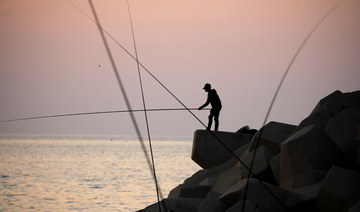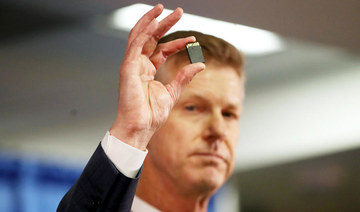CONCORD, New Hampshire: In September, Amer Fakhoury closed his New Hampshire restaurant to take his first vacation in years to visit family in his native Lebanon — a country he hadn’t been to for nearly two decades.
He hasn’t returned to the United States. Soon after his arrival in Lebanon, the 57-year-old American citizen was detained by authorities and remains jailed there. Doctors report that he is in poor health and that his condition is life-threatening, his family said.
No charges have been filed against Fakhoury. His lawyer, Celine Atallah, said it remains unclear why he’s being held. Fakhoury, however, was once a member of the former Israeli-backed South Lebanon Army. He also worked at a former prison described by human rights groups as a center for torture.
His family insists he had no direct contact with prisoners and never abused anyone, and there was never an abuse allegation against him.
They feel he’s being used as some sort of pawn in a country that has endured weeks of anti-government protests that led to the prime minister’s resignation last month. Banks, businesses, schools and roads closed for some time.
The protesters have been demanding an end to widespread corruption and mismanagement by politicians that have ruled the country for three decades. The leadership has been ignoring demands by the protesters to leave and continues to cling to power.
Fakhoury’s family and Atallah accuse authorities of torturing him. In early visits, Atallah and Fakhoury’s wife, Michelle, saw scratches on his face and marks on his neck. He also appeared to have lost a lot of weight.
His family said this week that his health has gotten much worse; doctors told them his condition is grave and life-threatening, including a bad infection, a bleeding disorder and other problems. A court session that was to be held this week has been postponed because of his illness.
“We’re very scared right now,” said Guila Fakhoury, the oldest of his four daughters, from her New Hampshire home. “We don’t know when we’re going to see him again. This is a nightmare for us.”
A State Department spokesperson said the US embassy conducted its most recent consular visit with Fakhoury on Nov. 7. No details were provided.
“We take allegations of mistreatment seriously and whenever we receive credible reports of mistreatment we raise our concerns directly with the host government,” the spokesperson said.
Fakhoury’s lawyer is not aware of other cases involving American citizens similar to his. State Department officials said they had “nothing further” in response to the question.
In New Hampshire, Fakhoury ran a Middle Eastern/Mediterranean restaurant, where he struck up friendships with patrons and community members. Interested in Republican politics, he once met Donald Trump on a presidential campaign visit. He also hosted fundraisers for a GOP congressional candidate.
Phyllis Woods, chair of the Strafford County Republican Committee, described Fakhoury as “a very caring, open, compassionate person” who was concerned about the lack of affordable housing available in the area.
About 30 family and friends held a rally at the restaurant in September to bring attention to Fakhoury’s case. A handwritten sign posted on the shuttered restaurant asked patrons to pray for his release.
Richard Riemer, of Newmarket, a regular patron, said he’s seen through the years how hard the family works. “You see the unity there,” he said, adding, “They’re still a little piece of my life.”
Fakhoury was one of many South Lebanon Army members who fled after Israel withdrew from Lebanon in 2000 following an 18-year occupation, fearing reprisals if they stayed in Lebanon. Others stayed and faced trial, receiving lenient sentences. The countries have been at war since 1948.
Fakhoury’s family says he came to the United States in 2001, where he started the restaurant with his wife and put his four daughters through the University of New Hampshire. But Lebanon was still home.
“My father, he’s the epitome of the American dream,” daughter Zoya Fakhoury said. “He came here for a better life for his family and he worked, he built a business, a successful business.” She said her family doesn’t deserve what’s happened to them.
Fakhoury started looking into a visit after President Michel Aoun last year encouraged former SLA members to return home. Like many others in the army, Fakhoury faced a charge in 1996 of collaborating with Israel, but that was dropped, Atallah said.
“He was actually granted assurances from the government, who reviewed his file and told him, ‘Your file is clear. Come back, you can come back to your country,’” she said.
He arrived in Beirut in mid-September, along with his wife and two of his daughters.
Security officials held onto his passport for a routine check and let him go. When he returned about a week later to retrieve it, a newspaper close to the militant Hezbollah group published a story accusing him of playing a role in the torture of inmates at the former Khiam prison. He was arrested a day after it appeared.
Scores of protesters outside a military court connected to Fakhoury’s case carried signs dubbing him the “butcher of Khiam”; some demanded he get the death penalty. A sign said “Just one bullet,” on a family picture, the daughters said, adding that they’ve received death threats online.
Fakhoury’s family and lawyer said he worked at the prison from 1989 to 1996. He handled paperwork, cleaned the prison and made sure inmates got their food.
“There’s no legal basis for his arrest,” Atallah said. “There’s no legal basis for his detention. ... He’s an American citizen, an innocent American citizen who’s being illegally detained.”
Given the current instability in Lebanon, it was unclear who could address Fakhoury’s case. Before the mass anti-government protests started, the Lebanese General Security Directorate said Fakhoury had possessed an Israeli passport. But Atallah said US records show he didn’t have one. Lebanon’s laws prevent its citizens from dealing with or making any contacts with Israel.
Fakhoury’s family said they are working with Sen. Jeanne Shaheen and the US Embassy in Lebanon. They also wrote to the White House but haven’t received a response. The White House referred questions on Fakhoury’s case to the State Department.
Fakhoury’s wife visits him and the daughters received a brief phone call from him during which he asked about his granddaughter and began to cry.
“It’s just such a sad time,” daughter Macy Fakhoury said. “The holidays are coming and both of my parents aren’t here.”
US citizen jailed in Lebanon as country deals with crisis
US citizen jailed in Lebanon as country deals with crisis

- Amer Fakhoury was detained by authorities in Lebanon and remains jailed there
- No charges have been filed against Fakhoury
Gaza aid still departing Cyprus by sea while landing pier fixed

NICOSIA: Humanitarian aid for Gaza is continuing to depart Cyprus by sea and will be held in floating storage off the coast of the enclave until a US-built military pier undergoes repairs, a Cypriot government official said on Thursday.
The US military announced earlier in the week that a purpose-built jetty it anchored off Gaza’s coast to receive aid by sea was being temporarily removed after a part of the structure broke off, two weeks after it started operating.
Cyprus Government Spokesperson Konstantinos Letymbiotis said offloading aid had slowed down, but the sea corridor had not ceased operating.
“The mechanism surrounding how the floating pier works allows for the possibility of floating storage off Gaza, with offloading to resume when conditions allow,” he said, blaming the problem on rough seas.
The pier was announced by US President Joe Biden in March and involved the military assembling the floating structure off the coast. Estimated to cost $320 million for the first 90 days and involve about 1,000 US service members, it went into operation two weeks ago.
A Pentagon spokesperson said a portion of the pier had separated and that the pier would be towed to Ashdod port in Israel for repairs. Letymbiotis said their information from the US was that the problem would be fixed in coming days and operation of the pier could ‘possibly’ resume by the middle of next week.
Eleven ship-shuttles of aid had left Cyprus since the operation started, with enough aid already disbursed to “provide food to tens of thousands of non-combatants for a month,” Letymbiotis said.
“The aim of offering humanitarian aid to 500,000 people a month is possible,” he said.
Rising violence strikes fear into West Bank school

“We tell the students ... to come to school together and not on their own, because we do not know when their (settlers) attack will be,” said Mazin Shehadeh, vice-principal for the high school located in a village south of the city of Nablus.
On the hill above the village sits the Israeli settlement of Yitzhar, from where Palestinians say settlers descend to attack them.
“Every day when we arrive, we inspect the area around the school for fear that there might be explosive devices,” said the educator, whose office floor was charred black by what he said was an arson attack.
Israel has occupied the West Bank since 1967 and now some 490,000 Israelis live across the Palestinian territory in settlements that are considered illegal under international law.
Palestinians have long faced harassment by settlers.
Recalling an attack on the school, one 15-year-old student said, “We were in class, and the settlers attacked us from the back of the school. They threw stones at the windows.”
“The (Israeli) soldiers were standing above, near the water tank, firing tear gas and stun grenades toward the school.”
Now the pupils fear an attack at any moment.
“At the slightest noise, at the slightest gunshot or at the slightest explosion near the town, we say to ourselves that the (Israeli) army or the settlers have attacked the school,” said Qais.
Since October 7, 519 Palestinians have been killed in the West Bank by Israeli soldiers or settlers, according to the health ministry in Ramallah.
More checkpoints and other Israeli military installations have been erected since the start of the war, complicating the journey to school.
“Sometimes the army harasses us, sends us tear gas bombs and sound bombs and prevents us from going to school,” said a 12-year-old student.
The school year, which ended on Wednesday, turned into “a nightmare” for Palestinian students, the United Nation’s children’s agency UNICEF has said.
Some 27.5 percent of elementary school students do not feel safe at school, according to a study by UNRWA, the UN agency for Palestinian refugees.
Between October 7 and May 7, 60 children were killed in the West Bank, 345 injured and 68 schools targeted by acts of vandalism, according to the Palestinian education ministry.
It said another 125 students have been detained by the Israeli military, who when asked by AFP about the arrests said they were part of their “counter-terrorism activities“
Last week, a 15-year-old boy was shot dead while evacuating from his school by bicycle during an Israeli military raid in the northern West Bank city of Jenin.
Even before the war, violence between communities in the West Bank near the school reached a record high.
In June 2023 two residents of Urif village, members of the armed group Hamas, killed four Israelis in an attack to the south.
In response, dozens of masked settlers could be seen in footage reviewed by AFP setting fire to a school and trees, and throwing stones at homes in the village.
In response to repeated attacks by settlers, school administrators in Urif said they had spent the equivalent of 62,500 euros on a tarpaulin to catch thrown stones and they have also installed barbed wire.
In the classrooms, thick purple curtains are drawn over barred windows, and staff run regular evacuation drills.
The violence and consequent fortifications have made students feel like they are trapped and “entering a prison,” said Shehadeh.
The school has had many of its “most hardworking and brilliant students” drop out, he added.
Others have left to help their parents, who have been without an income since Israel placed increased restrictions on Palestinians working in Israel.
Those pupils who remain only attend in-person classes three days a week and do the rest remotely due to the security concerns and the Palestinian Authority not paying teachers their full salaries.
However, not all students have the electronic devices or Internet connections needed to learn remotely, said Refat Sabbah, founder of the Teacher Creativity Center, a charity.
“In such a context, when students feel at risk at every moment, how can they learn? The psychological impact is huge on the students and the teachers,” he added.
Israel sent messages to Tehran to avoid Iranian response to embassy attack — agency

TEHRAN: Israel sent messages to Tehran via Egypt that it would “compromise” in Gaza to avert an Iranian response to an attack on Iran’s embassy in Syria, the Tasnim news agency reported.
The Iranian news agency’s report cited the head of Iran’s Revolutionary Guards Aerospace Force.
Iran launched explosive drones and fired missiles at Israel in April in its first direct attack on Israeli territory, a retaliatory strike for what it said was an Israeli strike on its Damascus consulate, in which seven officers of the Islamic Revolutionary Guard Corps were killed.
“Israel sent messages through Egypt’s foreign minister that it will compromise in the war in Gaza to avoid Iran’s retaliation,” Amirali Hajjizadeh said.
Ship attacked by Yemen’s Houthi rebels was full of grain bound for Iran, the group’s main benefactor
Ship attacked by Yemen’s Houthi rebels was full of grain bound for Iran, the group’s main benefactor

- The attack Tuesday on the Laax comes as the Houthis continue their attacks on shipping throughout the Red Sea corridor
DUBAI, United Arab Emirates: A Greek-owned, Marshall Islands-flagged bulk carrier that came under attack by Yemen’s Houthi militia earlier this week had a cargo of grain bound for Iran, the group’s main benefactor, authorities said Thursday.
The attack on the Laax comes as the Houthis continue their attacks on shipping throughout the Red Sea corridor, part of a campaign they say aims at pressuring Israel and the West over the war in Gaza. However, as shipping through that artery has dropped during the months of attacks, the militia have struck vessels associated with Iran, as well as Tehran’s economic lifelines of China and Russia.
Initially after the attack, the Laax had listed its destination as Fujairah in the United Arab Emirates. On Thursday, however, its listed destination instead appeared to be Bandar Khomeini, Iran.
A statement released by French naval forces based in the UAE that patrol the Middle East also identified the vessel’s grain shipment as being bound for Iran. It said that a team from Djibouti had inspected the damage caused by the attack, which it said involved both drones and missiles, and found no remaining dangerous explosives onboard the ship.
Images released by the French navy showed damage both at the waterline of the vessel, as well as on its deck.
Tuesday’s attack saw five missiles hit the Laax during the hourslong assault, the private security firm LSS-SAPU told The Associated Press. LSS-SAPU, which earlier helped evacuate mariners from the Houthi-attacked Rubymar that later sunk, said there had been no prior warning by radio from the Houthis.
LSS-SAPU had three armed security guards onboard the Laax at the time of the attack. Among the ship’s crew were 13 Filipinos and one Ukrainian, the Philippine Department of Migrant Workers said in a statement.
The Houthis in recent months have stepped up attacks on shipping in the Red Sea and the Gulf of Aden, demanding that Israel end the war in Gaza, which has killed more than 36,000 Palestinians there. The war began after Hamas-led militants attacked Israel on Oct. 7, killing about 1,200 people and taking around 250 hostage.
The Houthis have launched more than 50 attacks on shipping, killed three sailors, seized one vessel and sunk another since November, according to the US Maritime Administration.
On Wednesday, another US MQ-9 Reaper drone apparently crashed in Yemen, with the Houthis claiming they fired a surface-to-air missile at it. The US Air Force didn’t report any aircraft missing, leading to suspicion that the drone may have been piloted by the CIA. As many as three may have been lost this month alone.
Iran’s Khamenei hails US university students for Gaza support

- Universities in the US were rocked by pro-Palestinian demonstrations in April, triggering campus clashes with police and the arrest of dozens of people
TEHRAN: Iran’s Supreme Leader Ayatollah Ali Khamenei has praised university students in the United States for their protests over the rising death toll in the war in Gaza.
“You have now formed a branch of the Resistance Front,” said Khamenei, referring to Tehran-aligned armed groups across the Middle East arrayed against arch-foe Israel which is also known as the Axis of Resistance.
“As the page of history is turning, you are standing on the right side of it,” he said in a letter published on his official website on Thursday.
Universities in the United States were rocked by pro-Palestinian demonstrations in April, triggering campus clashes with police and the arrest of dozens of people.
The demonstrations began at Columbia University in New York and later spread across the country as well as to Europe and elsewhere.
Tehran has reiterated support for the Palestinian militant group Hamas since the outbreak of the war in the Gaza Strip.
The assault resulted in the deaths of 1,189 people, mostly civilians, according to an AFP tally based on Israeli official figures.
Israel’s retaliatory offensive has killed at least 36,171 people in Gaza, mostly civilians, according to the Hamas-run territory’s health ministry
Regional tensions have since soared, drawing in Iran-backed militant groups in Syria, Lebanon, Iraq and Yemen.
Tit-for-tat escalations led to Tehran launching hundreds of missiles and rockets directly at Israel last month.


















